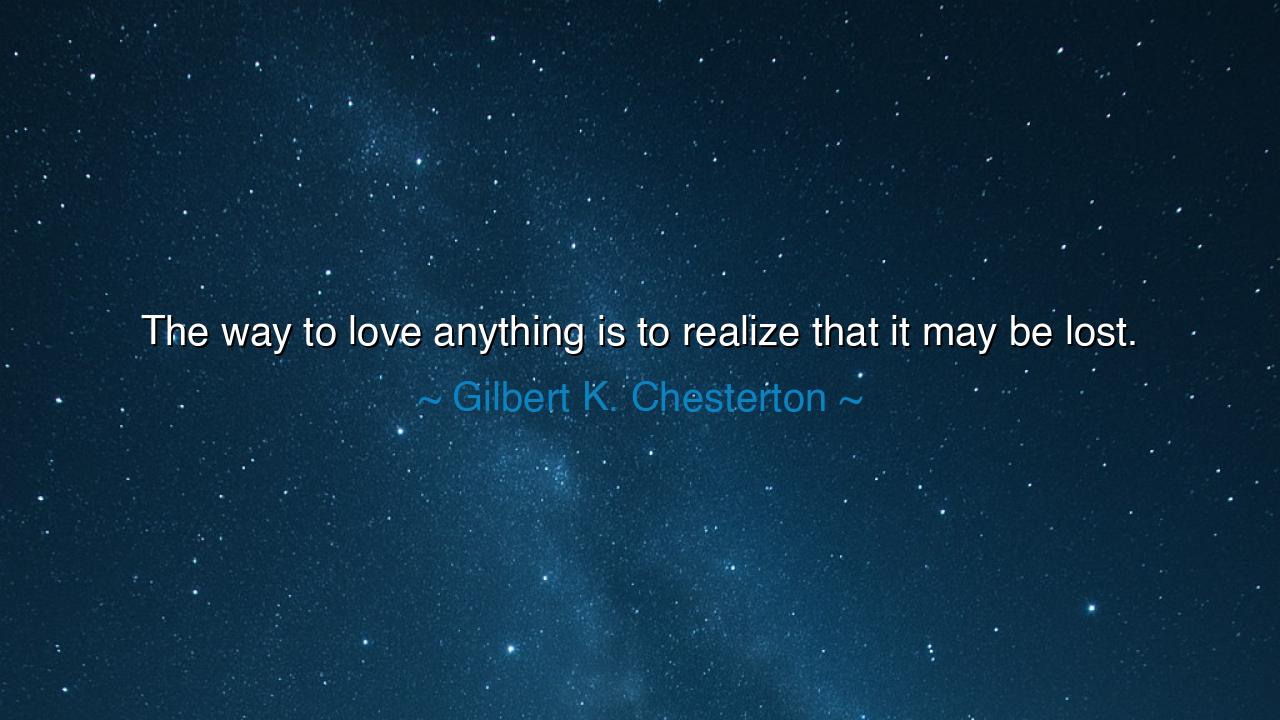
The way to love anything is to realize that it may be lost.






"The way to love anything is to realize that it may be lost." These evocative words by Gilbert K. Chesterton speak to the heart of what it means to truly love. In the depths of love, we often find ourselves wrapped in a sense of possession and security—we believe that what we cherish will always be there. Yet, Chesterton reminds us that to love something fully, to love it with all our heart, we must first recognize the fragility of life, the impermanence of all things. Only when we acknowledge that what we love may one day be lost can we approach it with the reverence and appreciation it deserves. Love is not an entitlement; it is a gift, one that is always temporary in its human form. To love fully is to embrace the truth of loss and to live with the intensity of gratitude for the present.
In the ancient world, the Greeks held love as one of the highest virtues, but they also understood its ephemeral nature. The philosopher Heraclitus, who saw the world as constantly changing, taught that everything is in a state of flux, even love. According to Heraclitus, nothing in this world is permanent, and to cling too tightly to anything is to invite sorrow. Yet he also believed that change was essential to growth and wisdom. Similarly, Plato in his Symposium spoke of love as a force that elevates the soul, but he acknowledged that the object of love—whether it be a person, a moment, or even a truth—is subject to transience. In this way, the ancients understood that to love deeply is not to possess, but to cherish in the knowledge that what we love may not always remain with us.
Consider the tragic love story of Helen of Troy and Paris, whose love led to the destruction of a city. Their love, though passionate and fierce, ultimately could not withstand the ravages of time and war. Their relationship was built upon the fleeting beauty and desire that come with the early stages of love. They did not fully grasp the magnitude of what they had until it was lost. When Helen left her husband, Menelaus, for Paris, their love was intense, but it was also vulnerable. It led to betrayal, war, and the eventual fall of Troy. In the aftermath, both Helen and Paris were left with the knowledge that their love, once so certain, had led them to a point of irreversible loss. Their story serves as a reminder that the things we hold most dear are always on the precipice of being lost, and it is only when we embrace this truth that we can fully appreciate the depth of our feelings.
Similarly, the story of King Midas offers a cautionary tale about the nature of love and loss. Midas, the king who wished for everything he touched to turn to gold, found himself in the grip of greed rather than love. His wish was granted, and he could turn everything to gold—but when he turned his own daughter into a golden statue, he realized the consequences of loving something without truly understanding its fragility. In seeking to possess everything, he lost the very thing he loved most. Midas’s story teaches us that to love something is to recognize its value while understanding that it may one day be taken away. Only when we accept this impermanence can we begin to truly cherish what we have.
Chesterton’s wisdom lies in the paradox of love—it is precisely because we know that what we love is fragile, that we must love it more deeply. To love with the knowledge that loss is a possibility brings an urgency and sincerity to our affection that would otherwise be absent. If we cling to love without acknowledging its fragility, we risk taking it for granted, allowing our attachment to become possessive and selfish. The true nature of love is found in the surrender to the present, in the freedom to experience its full beauty, knowing that we may one day be called to let it go.
The lesson Chesterton imparts is clear: love is a treasure that requires awareness of its fleeting nature. To love fully is to recognize that it may not last forever, that the object of our affection—whether it is a person, an experience, or a moment—is subject to loss. Acceptance of this truth allows us to love more deeply, more authentically, and with greater gratitude. It also teaches us to live without regret, for we understand that each moment spent in love is a gift that cannot be taken for granted.
In your own life, reflect on the things and people you love. Do you cherish them fully, or do you take their presence for granted, assuming they will always be there? Take time to appreciate what you have now, knowing that nothing is permanent. Love with the understanding that each moment of affection is precious, that each act of kindness is a sacred gift, and that even the smallest gestures carry weight. By embracing the truth of loss, you will find that love grows more powerful, more profound, and more meaningful in your life. Love in this way, and you will never feel the sting of regret, for you will have loved fully, knowing that every moment was precious and fleeting.






AAdministratorAdministrator
Welcome, honored guests. Please leave a comment, we will respond soon